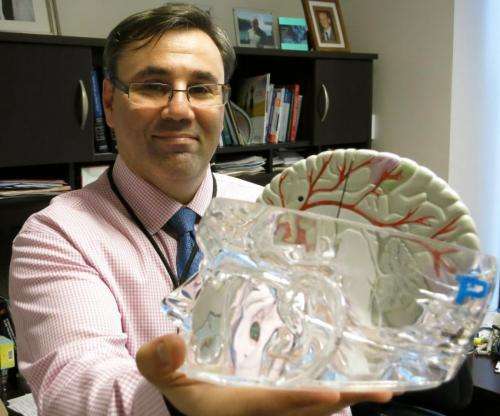Poker and marketing strategies might help doctors think better

Stroke doctors might be wise to think about poker players and marketers before making medical decisions, according to an article published today in the American Heart Association journal Stroke.
"Sadly, more research has gone into how decision are made when people gamble or buy a car than it has to discovering how doctors make complex decisions," said Dr. Gustavo Saposnik, lead author and director of the Stroke Research Unit of St. Michael's Hospital. "I think if doctors better understand a poker player's betting strategy or the psychology behind a salesman's tactics it might change their decision-making process. Doctors might be more encouraged to use tools that would help them make quick, accurate, unbiased decisions when facing difficult clinical scenarios."
Neither professional poker players nor doctors have all of the information when they make a decision. Just as poker players make decisions without knowing where every card is, an emergency room doctor may not be fully aware of all existing health issues, preferences or advanced directives of a patient.
Both poker players and clinicians have tools to assist them making a rational and informed decision with the information they have available. Professional poker players, for example, use risk assessment tables to assess the chance of winning a hand and determine whether to bet or fold. Stroke doctors have several risk scores at their disposal that estimate a patient's potential outcome with or without certain therapies.
"A University of Toronto study demonstrated that computerized tools more accurately predict stroke risk than stroke experts can on their own," said Dr. Saposnik, who is also an associate professor of Medicine at the University of Toronto.
Poker players may decide to continue betting despite a lower chance of winning, just as doctors may decide to go ahead with more aggressive treatments even when the risk may be high and the estimated benefit low. In the physician's case, however, this decision could be based on patient preference or family guidance.
"Understanding how stroke doctors make complex decisions will become more and more important because the population is aging," explained Dr. Saposnik. "This is significant to stroke care because many stroke risk factors – such as high blood pressure, heart failure, coronary artery disease – are more common in old age. This means stroke patients will become more and more complex."
The United Nations suggests that the number of older patients has tripled in the past 50 years and will triple again during the next 50 years. Older patients are also more likely to have more than one chronic health issues, such as diabetes and cancer.
"A patient with high stroke risk and multiple health issues makes stroke care decisions harder," said Dr. Saposnik. "The best thing we can do to improve care is to develop better risk assessment tools that take the nuances of each patient's condition and help us predict what we can't see. Understanding patients' preferences and seeking guidance from family members is also critical."
Dr. Saposnik doesn't think that lessons in logic are limited to casinos. Marketing and sales tactics have been refined based on research into how people make purchasing decisions.
Low ball is a marketing and sales tactic that involves quoting a low initial price to customers and increasing prices down the road. These regular prices are usually hidden, misread, or dismissed at the time of the initial offer. A classic example is a discounted three-month rate for a cell phone plan where the rate dramatically increases in price thereafter.
Customers accept the seemingly low ball deal and then are inclined to accept the higher price because they have already decided to purchase the item or service. Dr. Saposnik believes doctors might be similarly susceptible to the first offering.
"Treating stroke patients based on first piece of information may seem tempting," said Dr. Saposnik. "But doctors should carefully consider all relevant pieces of information for a more realistic assessment and better final decision."















